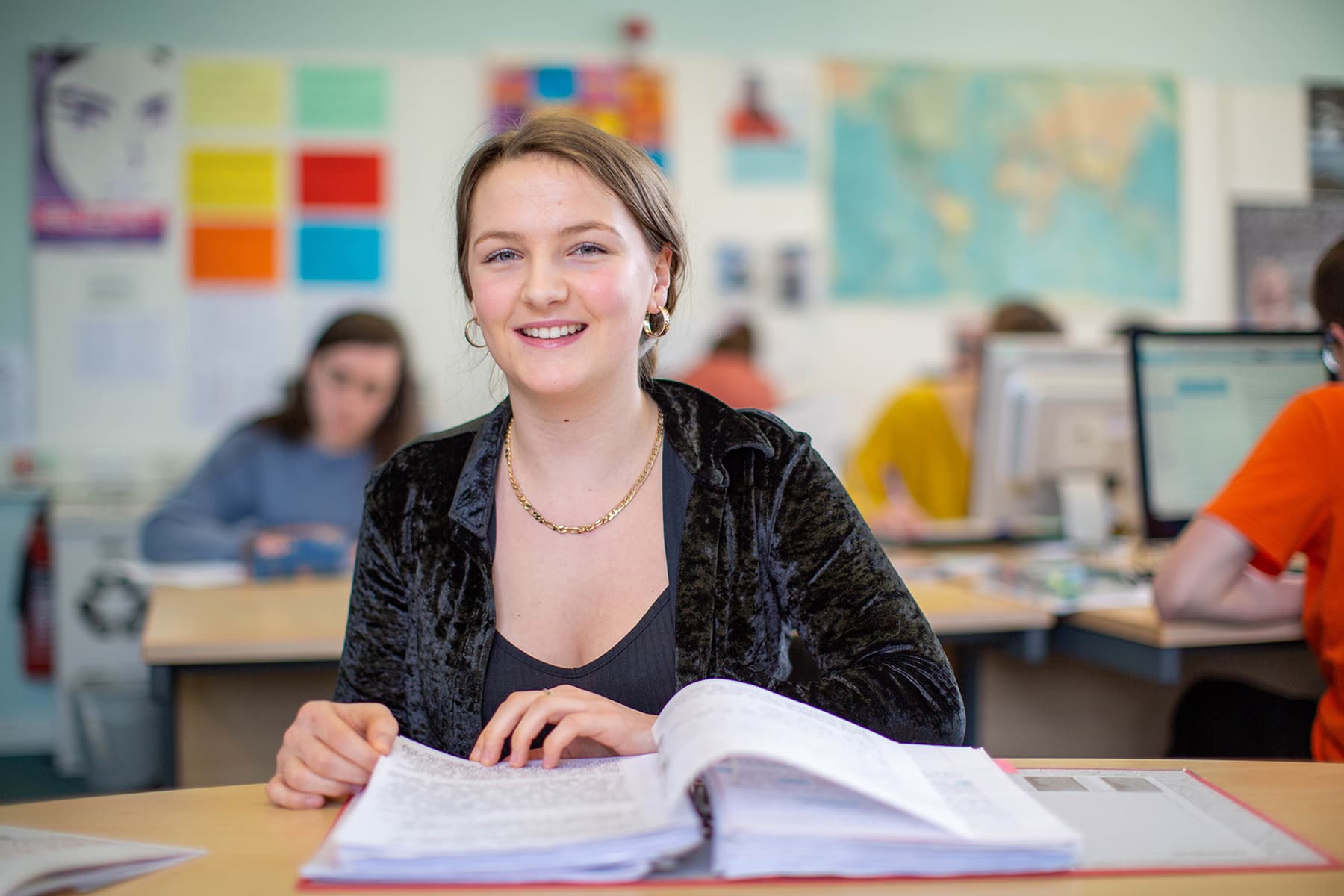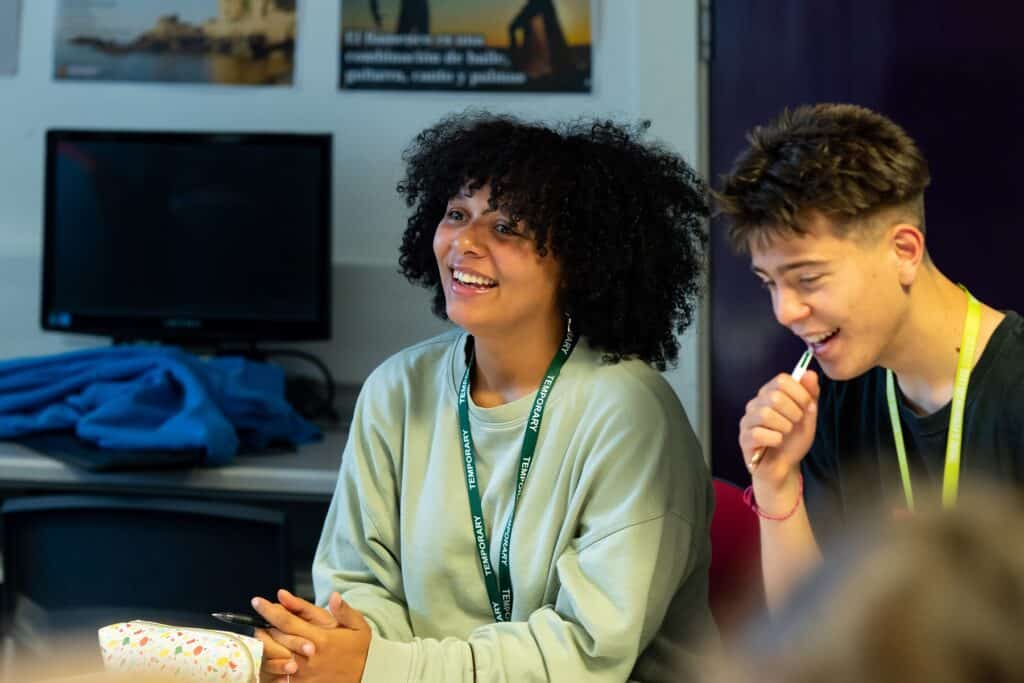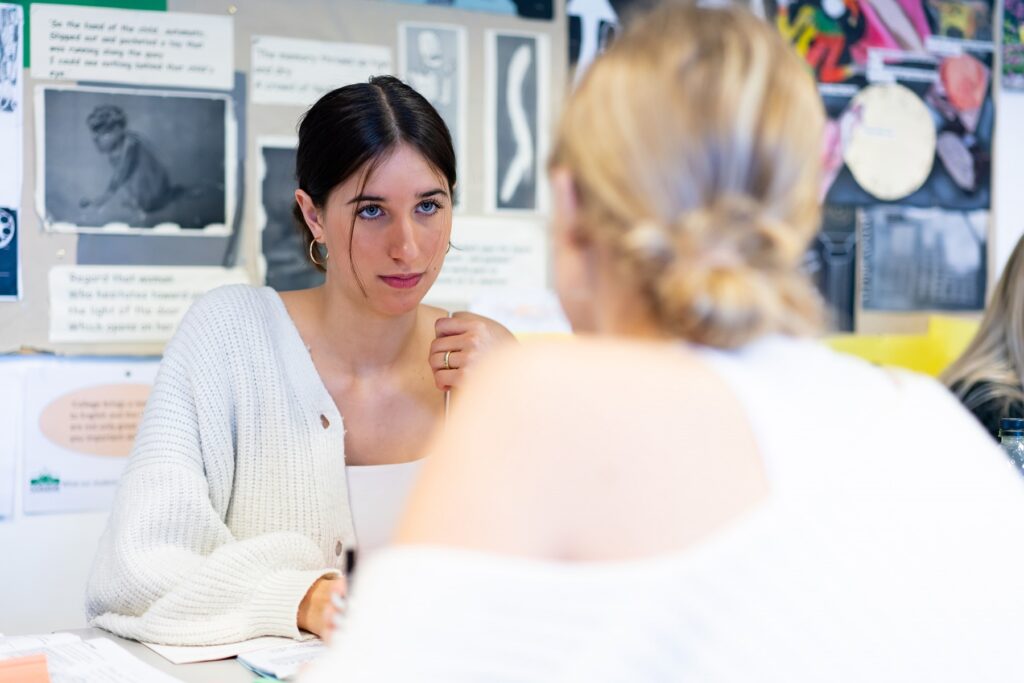New students starting in September: You can find more information about Induction days and submitting your GCSE results in our Start of Year Guide.
Why Choose this course?
Imagine you could take your innermost thoughts and insert them into someone else’s mind. Well, you already can; it’s called language. In English Language, we ask ourselves different questions… How does the analysis of language help to solve crime? How do we learn to speak and write? Is language being corrupted or is linguistic change gr8? You will also consider how identity is created through choices in language. Why do you say “please”? How does celebrity culture shape language? What impact can geographical and social factors such as gender, age and ethnicity have on identity? This is just a snapshot of what you will discover.
Apply for this course
Start date: 08/09/2025
Top Course Highlights
engaging lectures
real-life texts
thought-provoking topics
diverse career paths

range of exciting concepts
You will cover a wide range of exciting concepts and technical terms, developing your understanding of society, culture and language in a supportive environment. English Language therefore fits exceptionally well with many other subjects.

empowering subject matter
English Language encourages you to look at the world differently. Many of our students have commented on how empowering it is, often saying that they will never look at a text in the same way again.

write creatively
This subject encourages creativity and independence. You have the opportunity to write creatively for your coursework and carry out an investigation into a topic of your choice.
What will I learn?
You will develop your analytical skills, apply theories and learn a range of terms by exploring spoken, written and digital texts. We consider incredibly diverse ‘real world’ texts including everything from a short informal text message to a formal speech in the House of Commons. You will also study the hugely exciting area of child language. How can children learn language within just a few years? Is it innate or do they simply imitate? We will evaluate the views of theorists in response to such questions and analyse everything from a baby’s first babbling to a short story by a child in school.
How has the English language changed over time? From the influence of Caxton’s printing press and the King James Bible all the way through to the influence of the Internet, text speak (or ‘txtspk’!) and Americanisation, you will investigate how English varies globally, regionally and socially.
You will develop your skills as a creative writer; what’s more, you will choose what genre you write in: examples have included newspaper and magazine articles, speeches, short stories and travel writing… it is up to you! In the second year, you will also be able to conduct your own investigation; in the past this has included the study of film scripts, superhero comics and stand-up comedy performances amongst others.
Component 1: Language Variation (exam – 2 hr 15 min: 35% of A Level)
- Individual Variation: how writers and speakers use language to present themselves
- Variation Over Time: how language has evolved since 1550
Component 2: Child Language (exam – 1 hr 15 min: 20% of A Level)
- The spoken and written development of children aged 0-8
Component 3: Investigating Language (exam – 1 hr 45 min: 25% of A Level)
Independent research on one of these topics:
- Global English
- Language and Gender Identity
- Language and Journalism
- Language and Power
- Regional Language Variation
Component 4: Coursework: Crafting Language (20% of A Level)
- Creative writing within a genre of your choice
Where will it take me?
English Language is highly valued by universities and employers. It complements many subjects such as English Literature, Psychology, Sociology, Film, Media Studies, History and Health and Social Care. It can lead to jobs in diverse fields such as forensic linguistics, speech and language therapy, marketing, journalism and education amongst others.
Assessment Arrangements
Formal assessment for the A Level is at the end of two years. There are three exams worth 80% in total; the coursework is worth 20%. There will be regular assessments throughout the course and more formal end of Year one internal assessments to track your progress.
Entry Requirements
Five GCSEs at Grade 4 or above including a minimum of Grade 6 in English Language and Grade 5 in English Literature. Successful A Level students would normally have achieved some strong grades in a number of relevant GCSE subjects. It also helps to enjoy reading a variety of texts and have a love of the written and spoken word.
Information & Support
We encourage all students to read a wide range of texts and to conduct their own research into language, especially those who wish to study language or linguistics at degree level. You will keep a record of your own independent research and your analysis of diverse texts. The sort of texts collected and analysed include everything from product labels, music lyrics and interesting short newspaper headlines to complex newspaper articles, literary works and even your own creative writing!
For those who want to get a taste of what is to come, you could check out any of the following:
- Mother Tongue by Bill Bryson
- The Etymologicon by Mark Forsyth
- A Little Book of Language by David Crystal
Meet the staff, tour the campus and find out about life as a student at one of the best colleges in the country.








